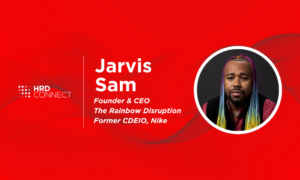‘If you’re in the HR world, this is your time’: Dan Schawbel on HR strategy in the post-pandemic workplace
- 13 Min Read
Dan Schawbel, Bestselling author of Back to Human: How Great Leaders Create Connection in the Age of Isolation, examines the new working world, HR’s role within it, and why HR strategy will become more instrumental than ever before.
- Author: Aaran Fronda
- Date published: Jul 6, 2020
- Categories

Following an historic period of upheaval in the working world, the time has come for HR to start building the workplace of the future. The crucial question is: what happens next, and what will this new HR strategy look like?
To find out, Michael Hocking spoke to Dan Schawbel, New York Times Bestselling of Back to Human: How Great Leaders Create Connection in the Age of Isolation and Managing Partner of Workplace Intelligence.
This is adapted from Dan Schawbel’s appearance on the HRD Live Podcast. Listen to the full episode here.
What have you made of HR strategy among businesses in the COVID-19 era thus far?
I think it all comes down to communication and leaders that people can trust. For example, if you’re communicating to workers that you need to furlough them, give them an approximate time of when you might rehire them. Even if you aren’t certain about it and you have to keep pushing the goalposts, it instills a level of trust, safety and security that will be very positive and help your brand moving forward. The way in which you treat people now is going to stay with you after the pandemic.
What I’ve noticed from companies that are handling this right is that they take the CDC policies, procedures, and guidelines, but also how governors in different States in America, or leaders in different countries are reacting, because if you live in Massachusetts, Texas, or Colorado, your experience is going to be slightly different in terms of the state laws and how companies are going to react to them.
Overall, I see that most companies have a phased approach and a set of guidelines that include social distancing restrictions. I think we have a real problem in the office, because 80% of offices globally are open offices. Of course, that is not very safe in today’s climate. One of the big predictions that I have is that I think more offices will be flexible and more closed off for safety reasons, because we could have another pandemic in the future. I think that we need to adjust now to ensure that we don’t have those issues.
I just did a poll which showed that most people are just not very comfortable going back into the office. I think that in order to instill trust, leaders need to communicate and assure workers that the space is going to pass the CDC test.
What kind of challenges do you think we might face in adapting to this new way of working?
I think there’s always going to be a risk when we’re in physical spaces. It’s not like, if you wear a mask, there’s a 0% chance that you can contract the virus. We don’t know how that’s going to play out. But I think that what is interesting is that there’s a big gap, especially in cities, in terms of demographics, between who’s going back to the office spaces.
I’ve been talking to a lot of companies that are keeping their staff remote, or having fewer people in their physical spaces. But while I do believe there is going to be a lot of relocation for cost savings, because millennials are at a time when their adulthood has caught up to them – they’re having kids, they need more space, they want to save money and so on – recent college graduates are suffering in their own way. Graduates anywhere from 22 to 25 or 26 years old, year in and year out, want to move into cities and work in physical office spaces.
That’s why so many companies had invested in office spaces within those cities. Even smaller companies are starting to invest in larger spaces. At the same time as I think commercial real estate and leases are going to decline, there is going to be a percentage that invest more in spaces because we need more distance between each other. I think this is another kind of phenomenon that I didn’t see coming up until lately. I think you can’t have a small space anymore, which is a big challenge.
It’s become harder every month to make bigger generalizations, because people are having all these different experiences. Therefore, it’s challenging leaders to take all of them into account. I think what leaders can do right is really empathize in their work, by having more communication, having their managers step up and really listen to their employees and really figure out what people are going through. How are you supposed to operate in a world where you don’t really understand what each individual employee is dealing with?
Do you think that flexible working will factor into HR strategy post-pandemic?
I’ve been talking about flexibility since the beginning of my career. I even carried out a work flexibility study seven or eight years ago. Everyone now thinks flexibility is remote work, but flexibility means thinking about an individual situation and trying to make it work for the employee. Maybe an employee has a kid they want to drop off in the morning, or maybe they work more effectively at eight o’clock at night, rather than eight in the morning. It means really taking into account not just how old this person is or their location, but their personal preferences, empowering them to work in a way in which they can be most effective, while simultaneously supporting the company and achieving results.
What the pandemic has done is pour gasoline on a lot of the trends that we’ve been talking about for years. It’s accelerated remote work, remote learning, remote interviewing; a lot of the things that we’ve seen happening for a while, most of which are using technology in some way. All these approaches to human capital management have been accelerated significantly, which could be a good thing. But there’s pros and cons to everything.
The stigma surrounding remote work has clearly gone, out of necessity. If you live in Idaho, you can now compete for a job in Silicon Valley with Google, whereas you would have had to relocate for that six months ago. But, at the same time, there’s now more competition for that job, because when you open the talent pool up to people living everywhere in the world, the pipelines become bigger, harder to manage and more competitive for the individual. While this is happening, there will be investments in technology, such as machine learning and artificial intelligence. For example, I think that the cost of virtual reality (VR) headsets will continue to decline and there will be more investment in that technology, because the goal is opening up the talent pool.
Also, because we’re paying attention to diversity, there is much more emphasis on using technology to truly broaden the talent pool – recruit from more schools, more countries, and very different communities, regardless of race, class, gender, and so on.
How hard do you think it is going to be for businesses to adapt the HR strategy?
The thing that comes to mind first is that, without a physical space and with more people working remotely, it’s harder to build a culture, because physical space is a fundamental element of culture. When you’re in a physical space, you can see, hear, smell, walk over and talk to your employee; it’s all part of the experience. Once you eliminate space, it’s harder to get a full sense of what a company is about.
I think the biggest obstacle is on-boarding. We had video interviewing before, which can be very effective, but I think the use of gamification and VR will receive more investment, because part of the goal of recruiting is to close the experience gap between not working at a company and then working at a company. Through these technologies, it’s almost like you work somewhere without working there. Therefore, you as a job seeker can make a better decision about who you work with and for whom you work. An employer can leverage all of that to filter the better candidates out, because if a job seeker doesn’t feel like they would fit into the culture based on the VR experience, they’re less likely to apply.
But if you eliminate physical office space, then what is putting on a VR headset really going to do for you? Another challenge that companies will have is creating this experience. How do we improve the recruiting process without space? Companies starting up right now that are remote already won’t have this issue, whereas a company that’s been around for 80 years is going to have a problem.
Before lockdown, there were a lot of companies that tried remote work and then brought people back to the office, such as Best Buy and Yahoo. Why did they bring people back? One reason that you might not find elsewhere is that they had new CEOs who brought people back to the office to have a sense of control and empowerment, and almost develop a new culture. But the thing that doesn’t get talked about is that it was a way to fire people. Because if you don’t want to work remote, or if you don’t want to work in a corporate office, that becomes part of your criteria.
Flexibility is much more popular now. I saw this trend happening between 2014 and 2016 with young people. In 2014 we did a study with Randstad, which found that flexibility was number two or three in terms of their criteria in searching for a job. By 2016, which is four years ago, flexibility was number one, over healthcare coverage.
I think you can compare it to how celebrities have talked openly about mental health and that’s lowered the stigma. I also see that with remote work. There was a stigma, which was that remote workers are not working as hard or are lazy. But now I think that stigma is wiped out.
I’ve always thought that, if you work in an office, you have a competitive advantage over remote workers because senior leadership can see you, they can hear you, and you can build more trusting relationships with them. Early research in my career found that yes, when promoting, executives choose favorites over non-favorites, and a lot of those favorites work in a physical space with leadership. Then I started having calls in the past few months with executives who said that they will give more preference to remote workers. I did a whole poll around this and, in fact, people would now rather promote remote workers than office workers. It was really mind-blowing. They said it was because remote workers are more self-directed.
How do you think this increased use of remote technologies might affect mental health?
Mental health was a problem before the pandemic and it’s an even bigger problem now. Hundreds of millions of people globally suffer from mental health issues. Now, with the pandemic and the corresponding recession coming soon in America, combined with the civil unrest that that’s happened over the past month, I think mental health will be the two most important words for the next decade when it comes to the workplace.
I believe that remote work can lead to more mental health problems, but again, it’s complicated. If you live with a spouse, you’re going to be less lonely. If you have kids at home, you’re going to be less lonely, but other issues will arise, such as stress or burnout. I’ve always said that everyone talks about the light side of working remote, but my book Back to Human exposes the dark side.
The light side is you get the freedom and flexibility to work when, where, and how you want to. But the hidden dark side that people didn’t want to talk about, but felt, was isolation and loneliness, from not seeing and hearing people in person for a given period of time. I think what’s really fascinating about technology is that we are still humans. We’re tribal. We want to connect with people, and that’s part of what makes us fulfilled and happy in our lives. The more we’re using technology, the more we want that.
As a great example, look at all of these people who are saying they can’t handle wearing a mask anymore, or that they just want to go out to a bar or a restaurant, or out into the street or, or to a park. It’s because there’s an inherent need for it. It’s Maslow’s Hierarchy of Needs. Love and friendship is right there in the middle of the pyramid after food and shelter.
Work-life balance is depleting, and as a result, HR has a greater responsibility to take care of employees’ mental health
I think one good thing that comes out of this is that you can just be yourself now. There’s a whole movement of bringing our full selves to work and I think that’s big. Also, how much can you really change who you are when your wife or husband is sat three feet away from you? I think that if people had concerns or issues around that in the past, it’s more normalized now.
The best thing that an organization can do is adapt its HR strategy and make sure that, during this period of time, you’re getting as much feedback and data as possible to make. If we go through this again, we can be much more prepared. We don’t want to make the same mistakes as we did in the past. We have to take this seriously now, because that is the best way to set up the future.
Are there any final thoughts you’d like to share with the HR leaders who really want to make the best of this scenario?
At the beginning of this, I thought a lot of HR professionals were going to be let go, but that actually wasn’t the case at all. In fact, what happened was that there was so much more of an emphasis on HR people and executives to take leadership roles in this and adapt the HR strategy accordingly. Getting any of them on the phone became so much harder, meaning that they were busy, which is a good thing, and that they had more of a presence in their organization.|
I’ve talked to a lot of my friends and peers in the past who have said they’re uneasy about going to HR people with issues because they are afraid they are going to get laid off or there will be repercussions. But I think that employees are now less afraid and may see more value in HR strategy, because HR has created this stronger presence. I think HR is getting a lot of positive feelings and sentiments now. If you’re in the HR world, this is your time. This is historic. You should be out there.
This is the most interesting period of time that we’re living in right now, because things are shifting so fast that you have to be paying attention seven days a week. So, expect the unexpected, prepare for the worst, and you’ll be set up for success.







